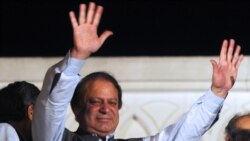The conservative politician poised to become Pakistan's next prime minister says he wants to continue good relations with the United States, but warned that Washington must take Islamabad's concerns about drone strikes seriously.
Nawaz Sharif spoke to reporters in Lahore Monday, two days after his Pakistan Muslim League party unofficially secured enough parliamentary seats to form a government.
Sharif said Islamabad has "good relations" with Washington, but he called the U.S. drone campaign in Pakistan's northwest a challenge to his nation's sovereignty.
The politician who served as prime minister twice in the 1990s has long been an outspoken critic against the U.S. policy that is deeply unpopular among Pakistanis. The program targets suspected militants in Pakistan's tribal regions bordering Afghanistan, reportedly with the Pakistani government's assistance.
Sharif also said his new government would support the U.S. withdrawal from Afghanistan by the end of next year.
Turning his attention to Pakistan's neighbor and long-time rival India, Sharif said he had a long discussion with Prime Minister Manmohan Singh by phone and that they extended invitations to visit each other's countries.
Singh extended support for Sharif on his "emphatic victory," saying he hoped to chart "a new course for the relationship" between the nuclear-armed neighbors.
Story continues below photo gallery
Afghan President Hamid Karzai also telephoned his congratulations to Sharif, relaying his hope that their bilateral relations would continue to strengthen and describing Sharif's campaign messages as "good for the well-being" of the two countries.
Throughout the campaign, Sharif appealed to all Pakistani parties to join him in ridding the country of its problems — including high inflation, unemployment, power cuts and a Taliban insurgency.
Election officials estimate the turnout in Saturday's poll at 60 percent, despite pre-election violence and attacks that killed at least 24 people on election day.
Sharif was Pakistani prime minister from 1990 until 1993, when he was forced to resign following allegations of corruption. He returned to the job in 1997 but was toppled by a military coup two years later.
Saturday's vote marked the first time Pakistan has transitioned from one civilian government that finished a full term to another civilian administration.
Some information for this report was provided by AP, AFP and Reuters.
Nawaz Sharif spoke to reporters in Lahore Monday, two days after his Pakistan Muslim League party unofficially secured enough parliamentary seats to form a government.
Sharif said Islamabad has "good relations" with Washington, but he called the U.S. drone campaign in Pakistan's northwest a challenge to his nation's sovereignty.
The politician who served as prime minister twice in the 1990s has long been an outspoken critic against the U.S. policy that is deeply unpopular among Pakistanis. The program targets suspected militants in Pakistan's tribal regions bordering Afghanistan, reportedly with the Pakistani government's assistance.
Sharif also said his new government would support the U.S. withdrawal from Afghanistan by the end of next year.
Turning his attention to Pakistan's neighbor and long-time rival India, Sharif said he had a long discussion with Prime Minister Manmohan Singh by phone and that they extended invitations to visit each other's countries.
Singh extended support for Sharif on his "emphatic victory," saying he hoped to chart "a new course for the relationship" between the nuclear-armed neighbors.
Story continues below photo gallery
Afghan President Hamid Karzai also telephoned his congratulations to Sharif, relaying his hope that their bilateral relations would continue to strengthen and describing Sharif's campaign messages as "good for the well-being" of the two countries.
Throughout the campaign, Sharif appealed to all Pakistani parties to join him in ridding the country of its problems — including high inflation, unemployment, power cuts and a Taliban insurgency.
Election officials estimate the turnout in Saturday's poll at 60 percent, despite pre-election violence and attacks that killed at least 24 people on election day.
Sharif was Pakistani prime minister from 1990 until 1993, when he was forced to resign following allegations of corruption. He returned to the job in 1997 but was toppled by a military coup two years later.
Saturday's vote marked the first time Pakistan has transitioned from one civilian government that finished a full term to another civilian administration.
Some information for this report was provided by AP, AFP and Reuters.







